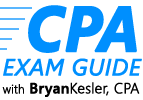- ✎ Updated
- ➫ by Bryan Kesler, CPA

ABOUT THE AUTHOR:
Bryan Kesler, CPA is a CPA Practice Advisor Top 20 Under 40, Licensed Certified Public Accountant, and founder of Kesler CPA Review, Community and Mentorship Platform.
- ❯ Accounting Careers
When you hear someone talking about CMA vs CPA as career paths, what’s your first thought?
If you said confusion or overwhelm you’re not alone.
The good news is if you make the right decision, the return on your investment absolutely dwarfs the monetary and time sacrifice you have to make.
The hardest part of making the CPA vs CMA decision is making sure you have the right information at your fingertips -- a clear understanding of what each of these designations are, their relative advantages and the steps to obtain each one.
So let’s start out with the basic information you need to choose which is the right career path for you.
What Is The Difference Between CMA and CPA?
#1: What They Do
First, CMA is the abbreviation for Certified Management Accountant, and CPA is the abbreviation for Certified Public Accountant. Most of the articles you read online position the CMA and CPA as requiring mutually exclusive skill sets. On one hand, you have the CMAs. Some people view this designation as the most suitable for folks with aspirations of managing a business.
On the other hand, you have the CPAs. Some people consider this designation as more appropriate if you see yourself going into more of a client service type of career path e.g. as a tax professional or auditor.
In more than 15 years of working with and around accountants, I can say almost every job description I’ve seen said “big 4 preferred” And big 4 firms are still in the business of producing CPAs. And I’ve never heard the CMA mentioned.
That’s not to say the CMA has no value but it should be a consideration for how you may want to prioritize your decision.
#2: Governing Bodies
The other (and less controversial main difference between the CMA and CPA designations is their respective governing bodies.
The Institute of Management Accountants (IMA) governs the CMA certification on a global basis. No need to worry about reciprocity when you move or anything like that.
To become a licensed CPA, each state governs their respective licensing requirements. If for some reason you end up moving, you can choose to add another state to your CPA trophy case (which is what I’d recommend since the incremental work is normally minimal) or you can opt to focus only on maintaining your CPA license in your current state.
Now that we have the basics out of the way, let’s talk about the tactical differences in the CMA and CPA certification paths.
Paths to Certification: Is CMA Harder Than CPA?
Experience
At first glance, the experience requirements look similar. The CMA requires two continuous years of work in financial or managerial accounting. For CPA licensing, most states require 1-2 years of experience as well.
The difference is the CPA experience often has to be signed off by an active CPA and in some states the person who signs off must be the direct supervisor.
Education
If you choose to go the CMA route, you need a Bachelor’s degree to obtain the CMA certification.
If you opt for the CPA licensure route, a Bachelor’s may be enough to sit for the exam but you’ll need to have 150 hours AND meet any specific course requirements for your state before you can receive your CPA license.
Exam
The structures of the exams are quite different. And while the exam structure probably shouldn’t be the deciding factor on your long-term career decision, I’ll present the information for completeness so you can make a fully informed decision.
The CPA exam consists of four sections, each with four hours allotted to it for 16 total test hours:
-
Audit (AUD): two multiple choice sections and three simulations
-
Business Environment and Concepts (BEC): two multiple choice sections, two simulations, and one written communication section
-
Financial Accounting and Reporting (FAR): two multiple choice sections and three simulations
-
Regulation (REG): two multiple choice sections and three simulations
The CMA exam used to have four sections, similar to the CPA exam, but now only consists of two four hour exams, both with 100 multiple choice questions and two 30 minute essays:
-
Financial Reporting, Planning Performance
-
Control and Financial Decision Making
Cost
When it comes to the cost of licensure, the first thing to consider is this should be an investment, not an expense!
That being said, there are two pieces to the investment you have to make to obtain either certification. There’s the initial investment of taking the exam itself and there’s the ongoing cost.
The initial investment to take the CPA exam runs about $1,000 on average while the CMA is also between $800 and $1,000 based on your career stage when you enter the IMA program (note: you have seven years to meet all CMA requirements even though the two sections of the exam must be passed within a three year window.).
Each certification also requires an ongoing investment in continued professional education (CPE) -- 30 CPE hours / year for CMA and typically 40 hours/ year for CPA. The IMA also has a required annual fee that can be as high as $230.
If you’re keeping score on the overall path to certification, the CPA exam’s requirements are a little stricter (which may explain the decline in CPA candidates) and you’ll probably spend a little more to meet the CPE requirements for the CPA exam.
CMA vs CPA Exam Difficulty: Which Is Harder?
So we covered the logistics of the exam structures and path to certification but now let’s answer a question you almost certainly have if you’re trying to make a decision between the CMA and CPA certifications -- which test is harder? You could make the argument the CMA exam is harder now than it was before because you have to study the same breadth of content for two exams instead of spreading across four. You could make a counter argument that CMA’s three year window to pass makes it easier than the 30 month window that applies to the CPA exam.
The truth is both require dedicated study time and you should plan on taking a review course for either path you choose.
The Bottom Line: Is CMA Better Than CPA?
The short answer is no, despite the 47% growth rate in new CMAs.(I suspect many of the new CMAs may have CPAs also but don’t have the data to back it up.)
This is like asking if a specialized masters degree is better than getting your bachelors degree…
… or if having nice rims is better than having a car that starts.
One is core, and the other is nice to have…anchor vs. optional add-on.
If you’re reading this, you’re obviously a numbers person so let me give you some numbers to back up what I’m saying.
CMA vs CPA Salary: Numbers Never Lie
Here’s the deal. As of the time of this article, CPAs see about an 8% increase in starting salary compared to their CMA peers. And that difference is consistent for overall average salaries too. You can quickly do the math how on that difference compounds over a 30-40 year career and what that means for the wealth you can create for your beneficiaries.
How To Prepare For Your Exam Once You Make The CMA vs CPA Decision
The truth is no matter where you land on the CMA vs CPA debate, it requires a big commitment on your part. In exchange, you deserve to get the best financial return and access to the most career options, so today I encourage you to F.O.C.U.S. (follow one course until success) and you can do that by finding your CPA mentor here.
If you still think CMA is the right choice for you to start your career, you’ll be better off than not getting certified and I’d encourage you to consider a CMA review course to knock the exam out as quickly as possible.









